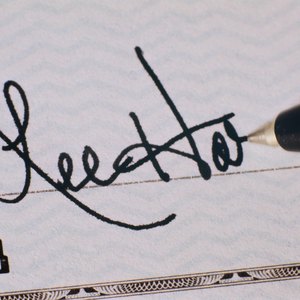
Cashing a check written for more than $10,000 does take extra steps compared with cashing a smaller check. If you have a good relationship with your personal bank, they may be able to assist you, but most times you must locate the bank from which the check originated. You should also keep in mind that all checks cashed for more than $10,000 are reported to the IRS.
Tips
In order to cash checks valued at over $10,000, you will most likely need to contact the bank from which the check originated.
Locate the Originating Bank
Call Ahead for Details
Call the bank and ask them what steps are necessary to cash the check. They will most likely tell you that you will need one to two forms of identification. Make sure the funds will be available the day you plan to cash your check. Be aware that banks follow their own policies and procedures. Some banks and branches may not cash checks this large, so do call ahead and save yourself the trouble of visiting a branch that cannot help you.
Discreetly Cash the Check
The bank will check your identification and take a thumbprint; they may even call the signer of the check to make sure it is valid. They will also complete a currency transaction report, which will be submitted to the IRS and includes your identifying information, such as your social security number and personal address. The IRS "$10,000 rule" requires that all cash transactions over $10,000 are reported to them. The aim is to identify the source of money and prevent money laundering scams.
Take Precautions and Stay Safe
In order to ensure your safety when handling and transporting large sums of cash, you want to bring something inconspicuous to carry the money in. You also should not tell anyone where you are going or what you are doing, especially in a public place where you can be overheard. Talk quietly when speaking with the bank teller. Request an escort from the bank to your car and deposit the money into a safe place as soon as possible. If possible, ask for a money order or cashiers check instead of cash. These financial instruments are treated like cash, but you're less exposed if you lose it.
References
- Fraud Fighter: Bank Secrecy Act, The $10,000 Rule
- Ithaca College: Accepting Cash and Checks Procedures
- Chase Bank. “Deposit Account Agreement and Privacy Notice,” Page 16. Accessed March 2, 2020.
- Experian. “Check Cashing: Are the Fees Worth It.” Accessed March 2, 2020.
- Federal Direct Insurance Corporation. “FDIC Consumer News: Beware of Fake Checks.” Accessed March 2, 2020.
Tips
- If possible, ask for a money order or cashiers check instead of a personal or business check, as it is treated like cash at any bank.
Warnings
- Banks follow their own policies and procedures and may not cash checks this large.
Writer Bio
This article was written by PocketSense staff. If you have any questions, please reach out to us on our contact us page.
